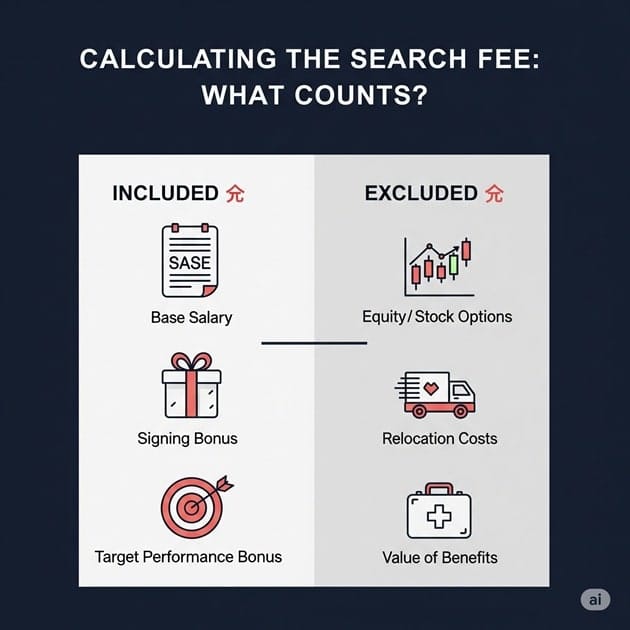When companies engage a retained executive search firm, they’re not just paying for resumes — they’re investing in a strategic, high-stakes process that requires clarity on one crucial detail: how the recruiter fee is calculated.
A major point of confusion arises around bonuses: Which ones count?
Do signing bonuses, performance bonuses, or commissions factor into the fee? And how do you calculate total compensation for recruiter fee purposes?
Let’s break down the nuances so your finance and HR teams are aligned from day one.
Understanding the Basis: Total First-Year Cash Compensation
In retained search, the fee is most commonly structured as a percentage of the candidate’s first-year total cash compensation. This is a broader figure than just base salary. It can include multiple forms of guaranteed and likely earnings, depending on the compensation structure of the role.
So, what is considered cash compensation for headhunter fee calculation?
It typically includes:
- Base salary
- Non-discretionary bonuses (tied to performance or retention)
- Sign-on bonuses (if contractually guaranteed)
- Guaranteed commissions
- Sometimes, stipends or allowances (if paid regularly as cash)
Equity, stock options, or long-term incentives that vest in future years are generally excluded, as they fall outside the scope of first-year cash earnings.

Is Signing Bonus Included in Recruiter Fee?
Yes — in most cases, signing bonuses are included in the recruiter fee calculation. If the bonus is guaranteed as part of the offer package and paid during the first year of employment, it is considered part of the first-year total cash compensation.
Example:
If a candidate is offered:
- $200,000 base salary
- $25,000 signing bonus
- $50,000 guaranteed year-end bonus
Then, for a firm charging 33%, the retained search fee calculation example would be:
($200,000 + $25,000 + $50,000) × 33% = $90,750 fee
Are Performance Bonuses Part of Executive Search Fee?
It depends on whether the bonus is discretionary or non-discretionary.
- Non-discretionary bonuses — tied to specific metrics or promised in the offer letter — are included.
- Discretionary bonuses — awarded at the employer’s whim with no formal criteria — are typically excluded.
So, are performance bonuses part of executive search fee?
If they’re structured and expected, yes. If they’re vague or occasional, no.
How to Calculate Total Compensation for Recruiter Fee
To ensure transparency and prevent disputes, the search fee should be based on the expected total cash compensation the candidate will realistically earn in the first 12 months.
Here’s a step-by-step guide:
Start with the base salary.
Add any guaranteed bonuses:
- Signing bonuses
- Guaranteed annual bonuses
- Retention bonuses
- Guaranteed commissions
Exclude:
- Discretionary bonuses
- Stock options
- Equity awards
- Perks (like company cars or health insurance)
This formula ensures you pay for the true value of the placement, not speculative upside.
Why This Matters
Misunderstanding what goes into the compensation figure can result in:
- Unexpected fee increases
- Disputes with your search firm
- Delays in onboarding due to contract renegotiation
Get it right upfront by clarifying:
✅ What bonuses are included
✅ What’s discretionary vs guaranteed
✅ What “total compensation” means in your specific agreement
Retained Search Fee Calculation Example (Recap)
Let’s say you’re hiring a Chief Marketing Officer and offer:
- Base Salary: $180,000
- Signing Bonus: $20,000
- Annual Performance Bonus (Guaranteed): $50,000
- Equity Grant (3-Year Vest): Not included
Then your retained firm charging 30% will calculate:
($180,000 + $20,000 + $50,000) × 30% = $75,000 search fee
Final Thoughts
In the world of executive search, clarity equals confidence. When evaluating how to calculate total compensation for recruiter fee, it’s not just about the numbers — it’s about the expectations behind them.
Always ask your search partner upfront:
“Is signing bonus included in recruiter fee?”
“Are performance bonuses part of executive search fee?”
“What is considered cash compensation for headhunter fee?”
This due diligence ensures your retained search agreement reflects reality — and prevents surprises later.
Next Steps: Ensure Clarity in Your Agreement
Defining compensation is a foundational step in any retained search partnership. Ensuring these details are clear in your agreement from day one prevents future misunderstandings and builds a stronger, more transparent relationship with your search partner.
Have more questions about the financial structure of a retained search? Our team is here to provide clarity.
🔗 For a complete overview of pricing, ROI, and more, read our foundational guide: The Retained Search Fee Structure Explained: A Guide to Pricing & ROI

